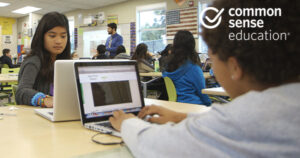 "Common Sense is the leading nonprofit organization dedicated to helping all kids thrive in a world of media and technology. They support pre-K–12 schools with lesson plans, edtech reviews, family resources, and everything else students need to thrive in a connected world." Below is a custom set of resources pulled from this month's newest updates! Check them out via the links and explore even more at www.commonsense.org/education. VSTE is proud to partner with Common Sense Education.
"Common Sense is the leading nonprofit organization dedicated to helping all kids thrive in a world of media and technology. They support pre-K–12 schools with lesson plans, edtech reviews, family resources, and everything else students need to thrive in a connected world." Below is a custom set of resources pulled from this month's newest updates! Check them out via the links and explore even more at www.commonsense.org/education. VSTE is proud to partner with Common Sense Education.
For Teachers:
- ChatGPT and Beyond: How to Handle AI in Schools
- Digital Literacy and Well-Being Curriculum
- Movies Based on Books with Reviews and Resources
- Professional Development Opportunities!
- AI Toolkit for School Districts: Though not technically PD, this toolkit can help your school(s) prepare for the impacts of generative AI.
- AI Teacher Assistants Risk Assessment: If you're planning to integrate AI tools for teachers, first take a look at our risk assessment.Engaging Families in Digital Well-Being: Click with Purpose
For Parents & Caregivers:
-
- Try These 5 Methods to Cope with Stress: The back-to-school season can be stressful, so pass along these tips to families.
All Resources via Common Sense Education




